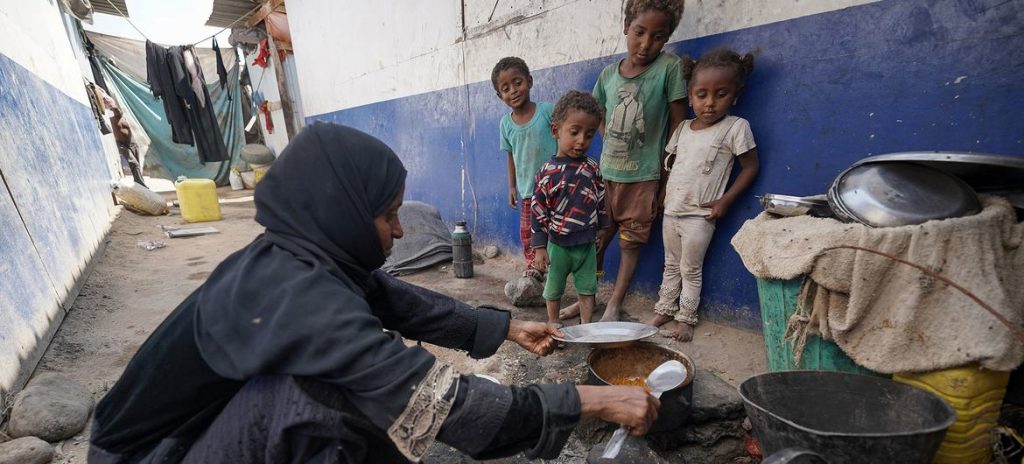Yemen health system ‘edging closer to collapse’ warns WHO …
Hopes are high for an end to the intense fighting between a Saudi-backed coalition allied with government forces and Houthi rebels and their allies, which has led to the near-total collapse of the economy since 2015, with tens of thousands killed and 21.6 million in need of humanitarian aid and protection this year, according to the UN.
“However, the country’s fragile health system is severely overburdened and on the verge of collapse,” said Dr. Annette Heinzelmann of the World Health Organization in Yemen, “while international donor funding is insufficient to avert further deterioration of the country’s failing health services.”
Acute child malnutrition
She stated that around 12.9 million Yemenis require immediate humanitarian assistance, with 540,000 children under the age of five presently suffering from severe acute malnutrition “with a direct risk of death.”
RELATED: Charlie Bird Shares ‘Good News’ Update Amid His Health Battle
Due to a lack of staff, funding, electricity, or medicines, 46 percent of health institutions in the country are only partially or entirely operational.
She told journalists at the UN’s usual Friday briefing in Geneva that the Yemen humanitarian “Health Cluster,” made up of 46 UN and non-governmental groups, had received only 62 million – or 16 percent – of the $392 million needed to assist the most vulnerable 12.9 million people.
“Disease outbreaks, particularly measles, diphtheria, dengue fever, cholera, and polio, are hastening Yemen’s deteriorating health situation.” These disease outbreaks are being triggered and spread by mass displacements, overwhelmed health facilities, interruptions in water and sanitation networks, and low vaccine coverage.”
RELATED: Hajdu says Vitamin-D COVID-19 protection is “fake news”
More than 13,000 new cases of measles, 8,777 instances of dengue fever, and 2,080 probable cholera cases were reported in the first quarter of this year. “However, the actual numbers are likely to be much higher,” she cautioned.
The system is barely afloat.
She stated that the WHO has been successful in maintaining an integrated response to Yemen’s health crisis in 10 critical areas:
1) Leading the national Health Cluster.
2) Maintaining therapeutic feeding centers (TFCs).
3) Increasing disease surveillance.
4) Managing all infectious disease epidemics.
5) Assistance with healthcare facilities and services.
6) Prevention and control of vector-borne, water-borne, and neglected tropical illnesses.
7) Combating chronic diseases such as diabetes, kidney disease, and cancer.
8) Keeping water, sanitation, and hygiene services in health care institutions in order to increase infection prevention and control procedures.
9) Promoting and improving maternal and neonatal care
10) Addressing unmet mental health needs.
RELATED: Best Face Wash For Breakouts
With the help of international donors, WHO was able to provide necessary medical equipment, supplies, and training to around 7.8 million individuals in 2022, accounting for almost 62 percent of the 12.6 million people targeted under the Humanitarian Response Plan for the year.
She further stated that WHO provided life-saving care to about 60,000 Yemeni youngsters suffering from severe acute malnutrition with medical complications.
According to Dr. Heinzelmann, WHO and Yemen’s health partners “are beginning to see the dire consequences of our severely underfunded efforts to mitigate Yemen’s health crisis.”
She mentioned the Yemen Health Cluster’s projected cessation of support for 23 of 43 health institutions in the Marib area, which is home to Yemen’s biggest population of internally displaced people (IDPs).
RELATED: Best Exercises To Strengthen Your Wrist And Avoid Injury And Pain
In consequence, this will effectively halt healthcare services for over 2.8 million of the region’s most vulnerable residents.
Out-of-money situation
She stated that WHO has “nearly no funds available to prepare for Yemen’s annual flood season, which is now underway and will bring a predictably significant increase in vector-borne and water-borne disease outbreaks.”
“In conclusion, I must stress the consequences of Yemen becoming a forgotten humanitarian crisis.” Yemenis are hardy, yet they are suffering immensely. More than two out of every three Yemenis rely on food, medical, and other humanitarian aid.
RELATED: 11 Best Jogging Tips For Health And Fitness
“To avoid untold human suffering and deaths in the coming months,” she said, “the international community must scale up support to Yemen.”

